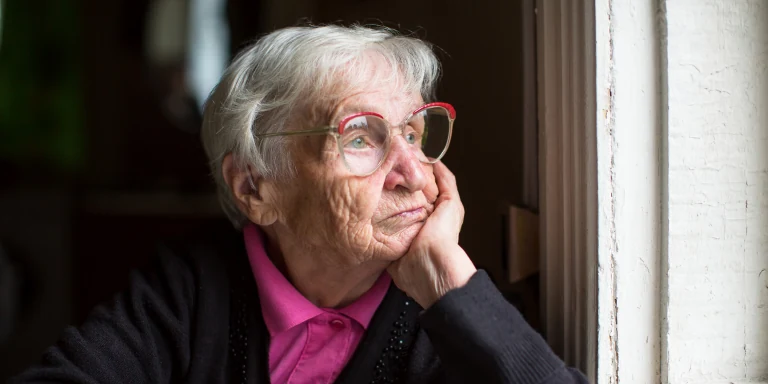
How to combat loneliness in older age
What does it feel like to be lonely in older age and how do you recognise the signs of loneliness in older age? Find out what you and your relatives can do to combat loneliness in older age and the consequences of such loneliness.
What is loneliness in older age?
Loneliness in older age is a topic that concerns many people. In Switzerland alone, around 160,000 people over the age of 62 say they are affected by loneliness now they have reached older age. Whether or not people feel lonely depends on their individual need for social interaction. Being alone in older age is not synonymous with loneliness; being alone in older age is a circumstance. If you are alone, you are not surrounded by other people. This applies if you do things alone. Loneliness in older age, on the other hand, is a feeling. Those affected feel isolated and empty – regardless of whether they are surrounded by people.
Recognising the signs of loneliness in older age
The signs of loneliness in older age are varied and differ from person to person. They range from physical to psychological symptoms. In the case of loneliness in older age, the physical symptoms include:
- Headaches, muscle and joint pain: loneliness in older age causes stress. This, in turn, increases the risk of headaches and muscle tension.
- Sleep problems: those affected experience poor sleep – to the point of insomnia.
- Digestive problems and weakening of the immune system: people experiencing loneliness tend to engage in unhealthy behaviour. They eat an unbalanced diet, don’t get enough sleep and don’t exercise enough. As mentioned earlier, they also experience more stress. All of this can lead to digestive problems and weaken the immune system.
- High blood pressure: chronic loneliness in older age causes high blood pressure in some cases. It also increases the risk of cardiovascular disease.
- Alzheimer’s disease: studies show a link between loneliness in older age and dementia. According to these, those affected have a 40% higher risk of developing it. This is because people who feel lonely have less challenging conversations and engage in fewer activities that stimulate brain activity.
In addition to the physical signs, there are also psychological ones. Among other things, loneliness in older age can lead to the following psychological symptoms:
- Isolation: loneliness and increasing social isolation in older age go hand in hand. Those affected find it difficult to engage in and maintain social contact.
- Dissatisfaction: as a result of their loneliness, affected individuals no longer derive satisfaction from their social and personal lives.
- Lack of motivation: people who feel lonely are listless and less productive.
- Anxiety episodes: people experiencing loneliness often feel insecure, worried and ill at ease. These feelings can trigger panic attacks.
- Depression: people experiencing loneliness are often pessimistic and feel increasingly helpless and overwhelmed. This in turn puts them at higher risk of depression.
- Poor concentration: the emotional burden of loneliness combined with sleep problems can lead to poor concentration.
Is a person close to you showing symptoms of loneliness in older age? Cautiously engage in conversation and offer your help. Where necessary, help them to find professional support. Or maybe you are affected by loneliness yourself and need emotional support? Contact organisations such as Pro Mente Sana or the Association Tel 43.
Reasons for loneliness in older age
The cause of loneliness in older age is social isolation. Those affected become lonely for various reasons:
- Difficult life events
- Deaths in their circle of friends
- Illnesses and physical limitations
- Lack of mobility
- Poverty in later life
Many people feel lonely in older age despite having children because they are not involved in family life. Possible reasons include the children living far away or their not valuing close contact with their parents. Being lonely in older age is a relevant topic regardless of whether or not you have children.
Loneliness in older age: consequences
Loneliness in older age has various consequences. These include:
- Reduced quality of life: loneliness affects physical and mental well-being. And where social contact is lacking, it can also be difficult to find joy and meaning in everyday life. As a result, the quality of life of those affected often decreases.
- Shorter life expectancy: loneliness in older age is associated with a higher mortality risk.
- Increased risk of financial exploitation and abuse: older people experiencing loneliness can be an easy target for fraudsters. This is because they lack a strong social network that could help them recognise and resist manipulation.
Preventing loneliness in older age
There are many ways to prevent loneliness in older age. These measures are also specifically intended to help those who are already struggling with loneliness in older age. So how do you overcome and prevent loneliness in older age?
- Do things that are good for you and bring you joy. Take care of yourself and do what you enjoy. Look after yourself and wear clothes that you feel good in. Keep asking yourself what you would most like to do at that moment and pursue that desire. Structure your day-to-day life and create routines to give your life direction and purpose.
- Revive friendships. Fulfilling social contact is one of the best tools for combating loneliness in older age, take writing letters to old acquaintances, for example.
- Be proactive. If you don’t want to connect with old friends, look for new ones. Why not talk to your neighbours, for example. It is important to remain open and receptive.
- Find a hobby. Get back into a former hobby or find a new activity that you enjoy. This will help you meet new people and stay active.
Are your parents or other people around you affected by loneliness in older age? As a relative, you can provide support. Encourage the person concerned to attend social groups for older adults or volunteer. Offer to drive them to these activities or accompany them. You should also involve the affected person in family activities, and show them how to use social media. For example, you can arrange video calls with them or talk to them virtually. Involve them in your life – for example with photos and small message updates. If you don’t have the time, contact other relatives. Plan together who will call or text and when.
If these measures do not help, talk to the affected person directly. Ask them how they feel. Seek therapeutic help if needed.
Other ways to combat loneliness in older age
As well as changes in everyday life, there are other measures, such as projects to combat loneliness in older age. A few examples (for the German-speaking part of Switzerland):
- Pro Senectute offers the opportunity to spend your free time in a convivial atmosphere. Among other things, the organisation arranges group meetings, courses and trips for older adults.
- The “malreden” project run by the association Silbernetz Schweiz offers older people the opportunity to talk to trained conversation partners by phone.
- The Swiss Research Institute for Public Health and Addiction (ISGF) has launched a theatre project and an SMS service for older adults, helping them to stay up to date with local events and excursions.
- If you want to be physically active, look no further than the “Zäme go laufe” project, where people over the age of 60 go for walks together in their local area and get to know new people.
- Silberprojekt is a platform for retired people. It offers the opportunity to organise and participate in projects.
- You can also contact your (church) community. They often organise lunches, card playing afternoons and gymnastics for older adults.
Still feel very fit? Then another idea could be to volunteer for a non-profit association set up to combat loneliness in older age. Volunteering is an opportunity to meet new people and do something good at the same time. Interested? Then get information from Caritas, for example.
Our health consultation advisors will show you how you can recognise, prevent and treat loneliness. We would be happy to put you in touch with appropriate support services, too.
Worried about loneliness in older age or already feeling lonely? You’re not alone. With just a few small changes to your life and some commitment, you can prevent loneliness in older age and improve your quality of life.

The specialist provided the editorial team with advice and input for this article. Ronja Schoch (dental assistant and Spitex carer) works in the Helsana Health Consultation Service. She helps customers on issues to do with ageing and later life, prevention and care.


Newsletter
Find out more about current health issues every month and get all the information you need about our attractive offers from all Helsana Group companies * delivered by e-mail to read whenever it suits you. Our newsletter is free of charge and you can sign up here:
We did not receive your information. Please try again later.
* The Helsana Group comprises Helsana Insurance Company Ltd, Helsana Supplementary Insurances Ltd and Helsana Accidents Ltd.